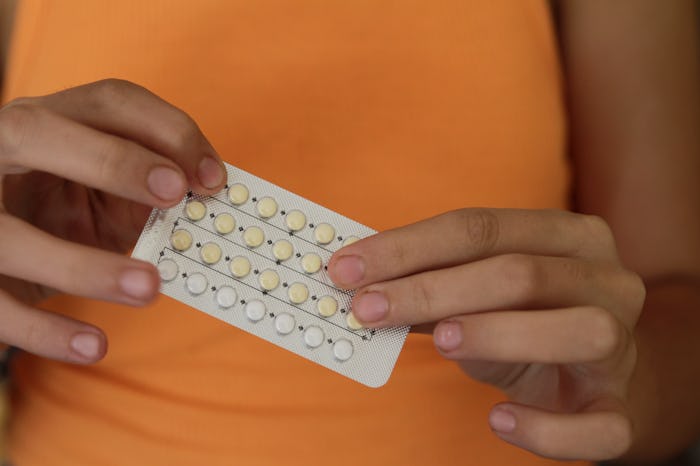Life

Do You Really Have To Worry About Long-Term Birth Control Affecting Fertility?
When you started taking birth control, you essentially said so long to worrying about things like ovulation dates and getting pregnant. And up until recently, your BC method of choice was working in your favor (hallelujah!), and life was good. But then times changed, and starting a family (or giving your child a sibling) started to take precedence in your life. And now you're wondering if taking birth control long term affects fertility ... or if you should stock up on some prenatal vitamins (again?).
So let’s relieve those fertility fears right away. Even if you have been taking birth control since, well, forever, it shouldn’t prevent you from getting pregnant. “There are no studies to show that birth control affects long-term fertility,” Dr. Joseph Adashek, M.D., F.A.C.O.G., a perinatologist, tells Romper. “Think about how many people take birth control at one time or another. If it caused infertility, we wouldn't have many children in the world.”
But just because you’ve been on long-term birth control, that doesn’t mean that you’ll be able to get pregnant instantly, either. Although there are no long term effects of BC (like birth control pills) on fertility, according to Dr. Barry Witt, M.D., a board certified reproductive endocrinologist and OB/GYN, you might still have to wait to see those two little lines on a pregnancy test. “There may be a delay in resumption of fertility due to the suppression of ovulation that can last up to two to three months after discontinuing birth control pills,” says Dr. Witt. “It does resolve quickly, though and you should be able to get pregnant.”
That said, there are other types of birth control that could put a crimp in your pregnancy plans. “Depo-Provera is a long-acting injectable contraceptive that is given once every three months,” says Dr. Witt. “Rarely, it can result in prolonged suppression of ovulation that can go on as long as 6 to 12 months after discontinuing it, so it can delay fertility significantly.” But when it comes to other forms of contraception, such as an IUD or an implant, “they should be completely reversible with no significant delay in resumption of fertility,” says Dr. Witt.
While most contraceptive methods won’t affect your fertility, there are others that will. “Permanent forms of contraception, like a surgical sterilization by bilateral tubal ligation (BTL) should not be considered reversible,” says Dr. Witt. And it’s important to keep in mind your maternal age when you’re considering conceiving. After all, infertility starts to increase as you get older and might impede your family plans. “Lots of women will say at age 40: ‘Okay, I'm ready to get pregnant,’" says Dr. Adashek. “Well, if they have been on the pill for 25 years and don't get pregnant, they blame it on the pill, but it’s their age that increases their risk of infertility.”
When it comes to birth control and your fertility, don’t fret. You should be able to get pregnant once you stop taking it barring any underlying medical issues. So speak with your OB/GYN to discuss family planning and the best way to come off of contraceptives so that you can conceive when the time is right.
Experts:
Dr. Joseph Adashek, M.D., FACOG, a perinatologist
Dr. Barry Witt, M.D., a board certified reproductive endocrinologist and OB/GYN